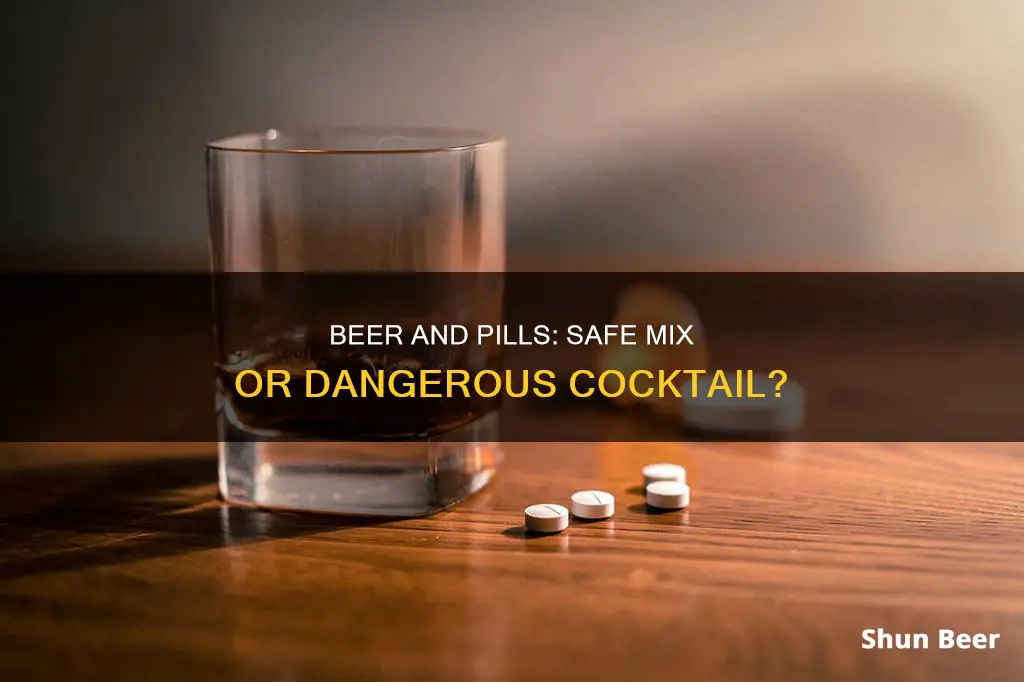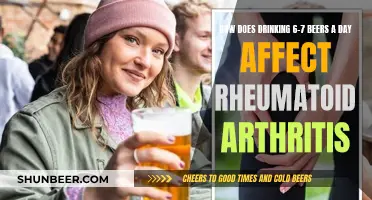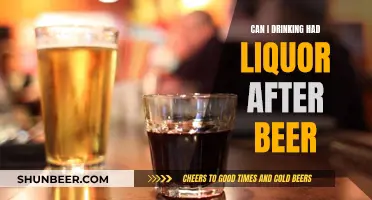
Drinking alcohol while taking medication can be a dangerous combination. Alcohol can interact with certain drugs, causing negative side effects, adverse reactions, and even overdose or death. The combination may intensify the effects of the medication or the alcohol, and can also make the medication less effective or change how you feel the effects of alcohol.
It is important to consult with a doctor or pharmacist about whether it is safe to drink alcohol while taking medication. This is because the effects of mixing alcohol and medication depend on a range of factors, including the type of medication and alcohol, as well as individual factors such as age, sex, and health status.
| Characteristics | Values |
|---|---|
| Should you drink beer while taking pills? | It depends on the medication and your health condition. Always consult a doctor or pharmacist before drinking alcohol while taking medication. |
| Factors that influence whether it's safe to drink alcohol with medication | The kind of medicine, the type and amount of alcohol, your age and sex. |
| Effects of drinking alcohol with medication | Drowsiness, forgetfulness, lightheadedness, impaired judgment, trouble concentrating, liver damage, death, etc. |
| Alcohol's effect on the body's ability to fight infection | Drinking alcohol while taking antibiotics can raise your risk of harmful side effects. |
| Alcohol's effect on medication effectiveness | Alcohol can make medication less effective or change how you feel the effects of the medication. |
What You'll Learn

Antibiotics and alcohol
Drinking alcohol while taking medication can be a bad, even dangerous combination. Alcohol can interact with medication in different ways, making the medication less effective or intensifying its effects. Alcohol can also affect how your body absorbs medication, increasing or decreasing the speed at which it is broken down.
Some antibiotics need to be taken with food, while others need to be taken on an empty stomach. It is important to always read the patient information leaflet that comes with your medicine.
It is generally advised to avoid drinking alcohol when taking medication or feeling unwell. However, it is unlikely that drinking alcohol in moderation will cause problems if you're taking the most common antibiotics. Nevertheless, some antibiotics can have side effects such as feeling sick or dizzy, which may be exacerbated by drinking alcohol.
- Metronidazole and tinidazole: It is best to completely avoid alcohol while taking these antibiotics, as drinking can cause very unpleasant side effects, such as nausea, vomiting, a fast or irregular heartbeat, flushing of the skin, dizziness, and drowsiness. It is recommended to continue avoiding alcohol for 48 hours after stopping metronidazole and 72 hours after stopping tinidazole.
- Linezolid: This antibiotic can be affected by undistilled (fermented) alcoholic drinks, such as wine, beer, sherry, and lager.
- Doxycycline: Alcohol can affect the effectiveness of this antibiotic, and it may be less effective in people with a history of heavy drinking.
- Rifampicin and rifabutin: These antibiotics can reduce the effectiveness of the combined contraceptive pill. Additional contraception, such as condoms, may be necessary while taking these antibiotics.
If you are unsure whether it is safe to drink alcohol while taking antibiotics, it is important to consult your doctor or pharmacist. They can provide specific advice based on your age, overall health, and the type of antibiotic you are taking.
Beer and Gum Grafts: What You Need to Know
You may want to see also

Painkillers and alcohol
Mixing alcohol with painkillers can have harmful effects on the body. Alcohol and painkillers can cause nausea and vomiting, headaches, drowsiness, fainting, or loss of coordination. It can also put you at risk of internal bleeding, heart problems, and breathing difficulties. In addition, alcohol can make a medication less effective or even useless, or it may make the medication harmful or toxic to your body.
Some over-the-counter painkillers, such as paracetamol and ibuprofen, are unlikely to cause any problems when taken with alcohol within the UK's low-risk drinking guidelines. However, it is important to read the leaflet that comes with the medication and consult a doctor or pharmacist for further advice.
Prescription painkillers, such as tramadol, gabapentin, and codeine, must be avoided while consuming alcohol. Alcohol can intensify the side effects of these medications, leading to severe drowsiness, nausea, and other adverse effects.
It is worth noting that older adults are at a particularly high risk of harmful interactions between alcohol and painkillers due to age-related changes in their physiology and their increased use of medications that can interact with alcohol. Therefore, it is crucial to consult a healthcare professional before consuming alcohol while taking any medication to ensure your safety.
Beer Drinking: Overcoming the Uncontrollable Urge
You may want to see also

Antidepressants and alcohol
Drinking alcohol while taking antidepressants is generally not recommended. Alcohol is a hypnotic-sedative, and as such, it depresses crucial bodily functions when consumed in excess. Mixing alcohol and antidepressants can worsen the effects of both substances, and in some cases, can be dangerous.
Worsened Side Effects
Antidepressants can cause drowsiness and dizziness, which can be intensified by alcohol. This raises the risk of falls and car accidents. Mixing the two can also increase feelings of depression or hopelessness. Antidepressants called monoamine oxidase inhibitors (MAOIs) can cause serious heart problems when combined with alcohol. When mixed with beer or wine, they can also cause dangerously high blood pressure due to tyramine, an amino acid found in these drinks.
Impaired Thinking and Alertness
The combination of antidepressants and alcohol will affect judgment, coordination, motor skills, and reaction time more than alcohol alone. Some combinations may make you sleepy, which can impair your ability to drive or perform other tasks that require focus and attention.
Increased Risk of Substance Abuse and Addiction
People with depression are at an increased risk of substance abuse and addiction. If you are finding it hard to stop drinking and are concerned about your alcohol consumption, there are many forms of help available, including substance abuse counseling, treatment programs, and support groups such as Alcoholics Anonymous.
If you are taking antidepressants and wish to consume alcohol, it is important to consult your doctor or pharmacist. They will be able to advise you based on your particular situation, including any other health conditions and medications you may be taking. In some cases, it may be okay to have an occasional drink. However, it is crucial to be aware of the potential risks and side effects of mixing alcohol and antidepressants.
Wine and Beer: Can You Enjoy Both?
You may want to see also

The effects of alcohol on healing from an infection
Alcohol has been clinically proven to impair wound healing and increase the chances of infection. The effects of alcohol on the healing process are quite significant, as over half of all emergency room trauma cases involve either acute or chronic alcohol exposure.
Alcohol exposure diminishes host resistance, and ethanol intoxication at the time of injury is a risk factor for increased susceptibility to infection in the wound. Studies have demonstrated profound effects of alcohol on host-defense mechanisms, although the precise effects depend on the pattern of alcohol exposure (i.e., chronic vs. acute alcohol exposure, amount consumed, duration of consumption, time from alcohol exposure, and alcohol withdrawal).
In general, short-term acute alcohol exposure results in suppressed pro-inflammatory cytokine release in response to an inflammatory challenge. The higher rate of post-injury infection correlates with decreased neutrophil recruitment and phagocytic function in acute alcohol exposure. Beyond the increased incidence of infection, exposure to ethanol also seems to influence the proliferative phase of healing. In murine models, exposure to a single dose of alcohol that caused a blood alcohol level of 100 mg/dL (just above the legal limit in most US states) perturbed re-epithelialization, angiogenesis, collagen production, and wound closure. The most significant impairment seems to be in wound angiogenesis, which is reduced by up to 61% following a single ethanol exposure. This decrease in angiogenic capacity involves both decreased expression of VEGF receptors and reduced nuclear expression of HIF-1 alpha in endothelial cells. The ethanol-mediated decrease in wound vascularity causes increased wound hypoxia and oxidative stress. Connective tissue restoration is also influenced by acute ethanol exposure, resulting in decreased collagen production and alterations in the protease balance at the wound site.
In summary, acute ethanol exposure can lead to impaired wound healing by impairing the early inflammatory response, inhibiting wound closure, angiogenesis, and collagen production, and altering the protease balance at the wound site.
As mentioned previously, the host response to chronic alcohol exposure appears to be different from that of acute alcohol exposure. Analysis of clinical data indicates that chronic alcohol exposure causes impaired wound healing and enhanced host susceptibility to infections, but the detailed mechanisms that explain this effect need more investigation.
Cough Syrup and Beer: A Safe Combination?
You may want to see also

Alcohol and the elderly
Alcohol and medication can be a dangerous combination, and older people are at a particularly high risk of harmful interactions. Aging slows the body's ability to break down alcohol, so it remains in the system longer. Older people are also more likely to be taking medication that interacts with alcohol.
Older individuals who want to drink and have no medical contraindications should not be taking any drugs (prescription or over-the-counter) that interact with alcohol. They may consider one drink a day to be a prudent level of alcohol consumption. However, patients should be counselled to avoid alcohol consumption immediately before bed to avoid sleep disturbances and warned of potential drug-alcohol interactions. They should also be told to avoid alcohol ingestion before activities such as driving.
The effects of alcohol on sleep are primarily detrimental, worsening insomnia and breathing disturbances during sleep. Although moderate drinking appears safe, alcoholic beverage consumption may exacerbate cognitive impairment and dementias of other etiologies.
Older people are less likely to seek professional help for alcohol abuse and less likely to listen to concerned loved ones regarding their alcohol consumption. This can create long-term alcohol abuse that causes a domino effect of mental, physical, and interpersonal complications.
Binge drinking is one of the top concerns for this age group. According to the Journal of the American Geriatric Society, more than 10% of individuals ages 65 and older are binge drinkers. Binge drinking is reported in nearly 1 in 40 elderly individuals in the United States, and an additional 1.6% of this population has been diagnosed with alcohol use disorder.
Beer Consumption and LDL Levels: A Concerning Link
You may want to see also
Frequently asked questions
It depends on the type of pills you are taking. Always consult your doctor or pharmacist before drinking alcohol while taking medication.
Drinking beer while taking certain medications can cause negative side effects, adverse reactions, or even overdose and death. Alcohol can also make a medication less effective or change how you feel the effects of alcohol.
Yes, there are several types of medication that should not be taken with alcohol, including antibiotics, antidepressants, anti-anxiety medications, painkillers, and diabetes medications.
The side effects can include loss of coordination, difficulty breathing, nausea, vomiting, headaches, drowsiness, fainting, changes in mood and behaviour, and lack of coordination.
If you are concerned about the risks of drinking beer while taking medication, you can try non-alcoholic beers or other drinks. It is important to check the labels of medications and consult a healthcare professional if you have any concerns.







